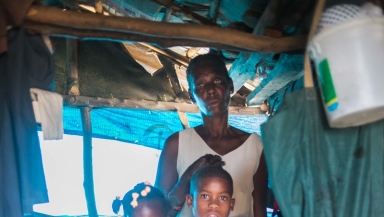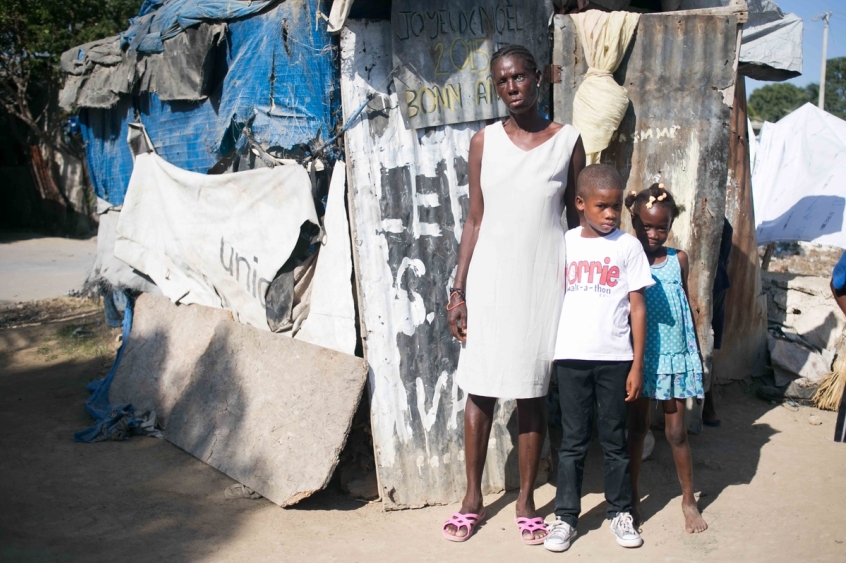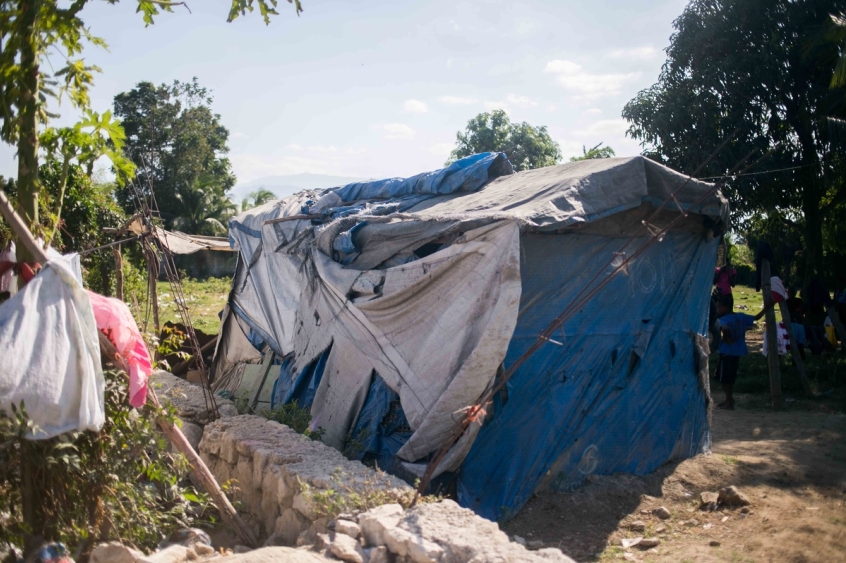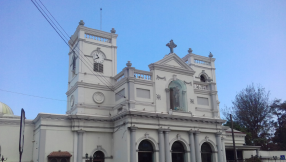
"There's poverty, there's extreme poverty, and then there's this."
Those were the words ringing in my ears as we left the home of Maquiloise and her children.
They came from someone who works for the charity Compassion's head office in Haiti.
Perhaps he should be on message, extolling the virtues of a child sponsorship programme that works with 90,000 children here, the poorest country in the Western hemisphere.
But we walk out of that shack not uplifted, but with a sense of the utterly oppressive poverty these people are experiencing.
Seven years ago an earthquake of a magnitude never seen before in Haiti shook the already desperately poor nation to its very foundations.
It killed 220,000 people and 1.5 million became homeless. In the aftermath many travelled from more remote parts of the coutryside to live in temporary accommodation on the outskirts of Port au Prince.
Many are still there.
Maquiloise's dwelling was made from scraps of tarpaulins, plastic and corrugated iron, about six feet by eight feet, and it sleeps seven people. Our presence – rich, sweaty, white westerners, plus our translator, not knowing where to sit – was incongruous.
Strung up over the bed were clothes, stacked in the corner of the dirt floor were a few plastic pots – the basics needed to cook a meal.
It was about as bleak as it gets.
The seven people who live in this shack are Maquiloise, her husband, three children and two grandchildren.

The only source of income is from her husband, who can sometimes get money from cleaning yards – perhaps three or four times per week – or Maquiloise can sometimes make a few dollars by doing some washing. It's not much – she might wash clothes for the whole day and get 100 goude ($2).
And there is never enough to eat. They eat cereals and rice, and perhaps once a week soup thickened with flour. There is nowhere to wash, nowhere to sit.
This family has a Compassion sponsor. Seven-year-old Mackeson has been sponsored for two years, and it's made a difference; he has a school uniform and books, and can attend the school around the corner from his house.
He still struggles with learning. The teacher says he doesn't get much help at home. It's not difficult to see why.
When we ask what he'd like to be when he grows up, he says "Doctor". When we ask the mother if she has a dream for her son, she says she can't answer that.
The sponsor, from the USA, is quite engaged with the family, and has even been to visit; he took one of the children and went to the beach. She wasn't able to communicate and there was no one there to help.
It's hard to shake the feeling of being a terrible intrusion, though we are repeatedly told that these home visits are considered a great honour.
It's really, really sad.

And there's something unbearable about not being able to fix it, which may be why we run from it more than we face it.
Psalm 12:5 says: "Because of the oppression of the weak and the groaning of the needy, I will now arise,' says the LORD. I will protect them from those who malign them." The words oppression and groaning feel very pertinent.
The trouble is, this family already receives all the help they are going to get.
Perhaps in 10 years we will see the difference it makes. But right now it feels utterly hopeless.
Another problem is that this family is just a drop in the ocean. There are 20,000 others in Haiti – or is it 40,000? No one's quite sure – living in these 'tents', and apparently this isn't even the worst of them.
Before the earthquake Maquiloise rented two rooms and had a piece of yard.
"Sometimes I feel heartbroken for families who leave the countryside and come to Port au Prince to look for jobs," a Haitian pastor told me. "In the country everyone has access to mangoes and avocadoes. Sometimes I think that's better. I spent my first 10 years in the country and have never seen anyone who lives like this."
He has another theory about why people are living like this – counter-intuitive, but chillingly convincing. It's about the famed resilience of the Haitian people, who have survived generations of poverty and oppression.
"Sometimes resilience goes too far. Some people are living in Port au Prince for a long time. After a year or two, it becomes normal life."
It's not even the worst he's seen.
"There should be another word for extreme poverty. This is a level below. It's good to be resilient, but sometimes it goes too far."
Since the 2010 earthquake, the resilience of tens of thousands of Haiti's poor has been tested again and again. In 2016 Hurricane Matthew devastated the country, leaving more than 1,000 people dead. It left an even deadlier threat in its wake: the cholera introduced by UN soldiers after the earthquake has accelerated and is already killing people. It's distasteful to compare deaths, because all grief is the same, but instructive too: in the US the death toll was 26 and there is no cholera.
Hundreds more people died in Haiti because they are poor.
I think we can react to this in two ways. One way is to be crushed by it – the scale of the problem, the depths of the squalor, the hopelessness of the victims. I felt it when I was there.
But the other way is to get angry. This is not acceptable. These people are children of God, made to flourish in body, mind and spirit. They weren't created for a life like this. And I still believe that this holy anger can change things. Because in the end it's not just about compassion. Stories like Maquiloise's need to convince us of God's absolute rejection and abhorrence of extreme poverty. And as Amos said: "Let justice roll on like a river, righteousness like a never-failing stream" (5:24).
Ruth Mawhinney travelled to Haiti with the charity Compassion, which sponsors almost 90,000 of the poorest children in the country. For more information or to sponsor a child there, visit its website.













